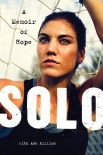Solo by Hope Solo (best books to read for women .txt) 📗

- Author: Hope Solo
Book online «Solo by Hope Solo (best books to read for women .txt) 📗». Author Hope Solo
I stuck close to Phil at training and tried to keep away from Greg and his mood swings. The World Cup was less than a year away, and I needed to make sure I had the goalkeeping job on lockdown.
I had a legend behind me, which kept me on edge.
IV.
Go!
I sprinted 800 meters, staying near the front with Aly. A minute rest.
Go!
Another 800.
Go!
And another . . .
I was the only goalkeeper doing all the 800s. In fact, I was one of the few players doing them—most viewed 800s as punishment for players who needed extra fitness work. But I wanted to do them. I hated that goalkeepers were often last in fitness. I wanted to be one of the fittest players on our team.
We did cone drills—sprint, turn, back—to five yards, ten yards, up to twenty-five yards out. Turn, stop, start, again. It was great work for strengthening our legs, ten sets. Up and down. Up and down. I dove for ball after ball, landing on my shoulder, ten, twenty, fifty, a hundred times.
V.
New Year’s Day, 2007. The Women’s World Cup was in September, and I was the team’s starting goalkeeper. This was going to be my year. We won the Four Nations tournament in January in China, which felt like a World Cup preview, and we won the Algarve Cup again in March. I was already the second-most-capped goalkeeper in U.S. history.
In early April, we started another training camp in Southern California, one that would count us down to our departure for China. Because we would be traveling so much for our “send-off tour,” there was no need to rent an apartment. I stayed at the Residence Inn in Torrance.
On Sunday morning, April 22, hours before the sun rose in California, the World Cup draw took place in Wuhan, China. We were placed in the most difficult group of the four, along with Sweden, Nigeria, and North Korea. The inclusion of North Korea seemed to upset Greg. He had just seen them play China in a pre-draw match, and their talent was undeniable. The draw appeared to be a political move to keep the North Koreans away from host China. That benefited China but hurt us: we would open against one of the best yet least transparent teams in women’s soccer. North Korea was hard to scout. The only time we had ever played North Korea was in the previous two World Cups.
But that Sunday morning, the politics of the World Cup draw was the last thing on my mind. I was alone in my room at the Residence Inn when my phone rang. “Hope,” my mother said. “I have some terrible news about Liz.”
My dear friend from high school, Liz Duncan, had been out for her usual Saturday run near her apartment in Seattle. She stopped on the median of a busy street, waiting for the light to change. A sixteen-year-old girl in a Pontiac Grand Am lost control of the car, jumped the curb, and hit Liz. She died at the scene.
I was distraught. Liz and I had been basketball and soccer teammates; we played hard and laughed hard. During college, we were friendly rivals: Liz played soccer for Washington State, and I loved seeing her on the field, trying to score against me. When we were both home from college, she would push me to go on training runs with her, mile after mile in the cold along the Columbia River. She had been a track star at Richland High, and she helped me get in the best shape of my life.
That morning Liz had been doing what she loved best: she ran every single day. I could envision her in a mesh running cap and black running tights, her ponytail swinging behind her. She had just registered for the Chicago Marathon. Her motto was “Life’s short. Run long.” She was days away from her twenty-seventh birthday.
I had never had anyone close to me die. I wasn’t sure what to do. My mother stayed on the phone until I calmed down. Then I called Phil and asked if we could meet for coffee. I started to cross the street toward Starbucks, but I froze in the middle of the crosswalk—there were so many cars going in so many directions, lights blinking, loud noises. I rushed back to where I had started. A car had killed Liz on a street like this. How could life be so easily snuffed out? I broke down in tears.
“Phil, I think I need to go home,” I said.
I felt tentative, unsure. Could I leave while we were preparing for a World Cup? Was it OK to attend the funeral of one of my best friends? Would my spot be in danger? Would I be letting down my team? “Hope, if you need to go, go,” Phil said.
I did. Some things are more important than soccer. I spent a week in Richland. I wept over Liz’s casket at the viewing. I mourned at her funeral. I spent time with her grieving mother. I came back to the team feeling fragile and cracked, as though one hard hit would break me open.
CHAPTER ELEVEN
“Only a Daughter Cries Like That”
Another hotel room. Another city. Another phone ringing.
I rolled out of bed and saw that I had missed a call. I had to stop and think for a moment. What day was it? What city was I in? Why was I here?
Friday, June 15. Cleveland. Tomorrow we had a game against China, the first in our “send-off” series





Comments (0)